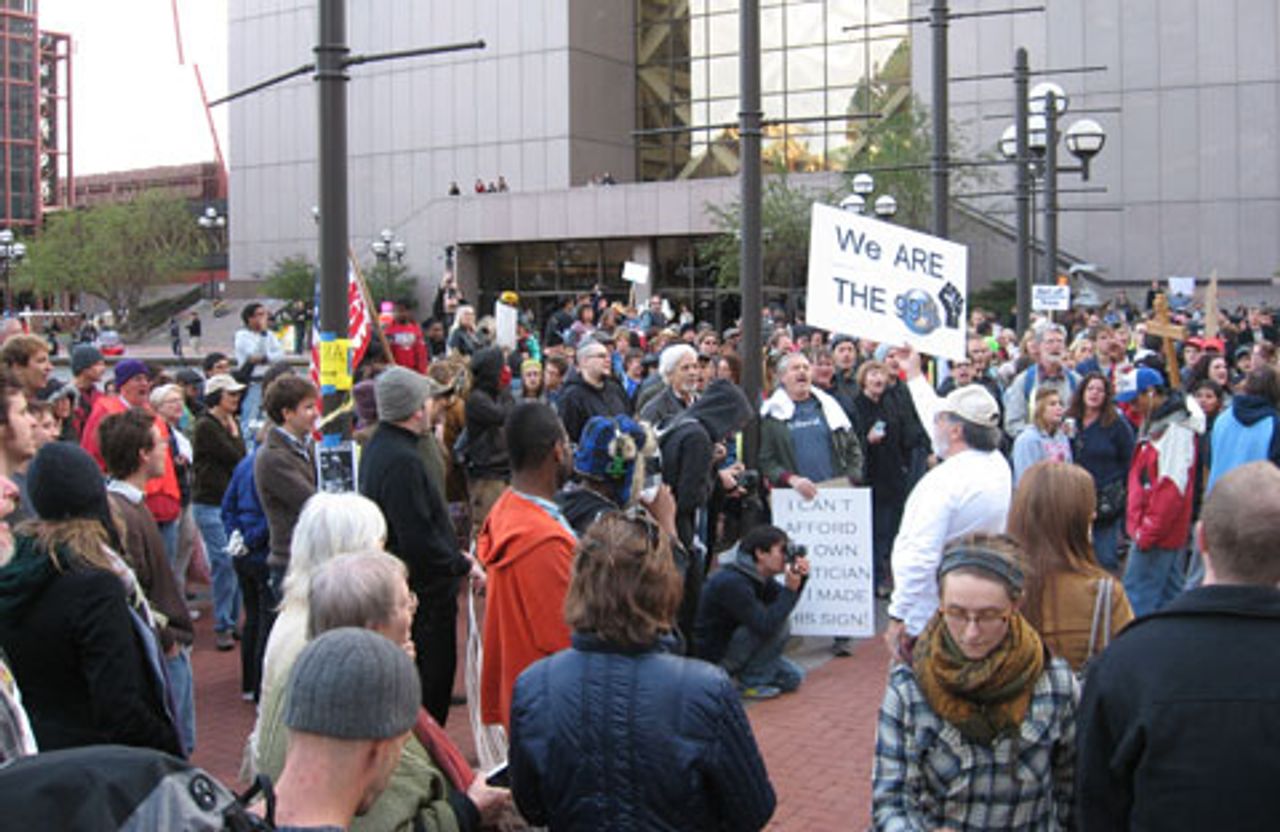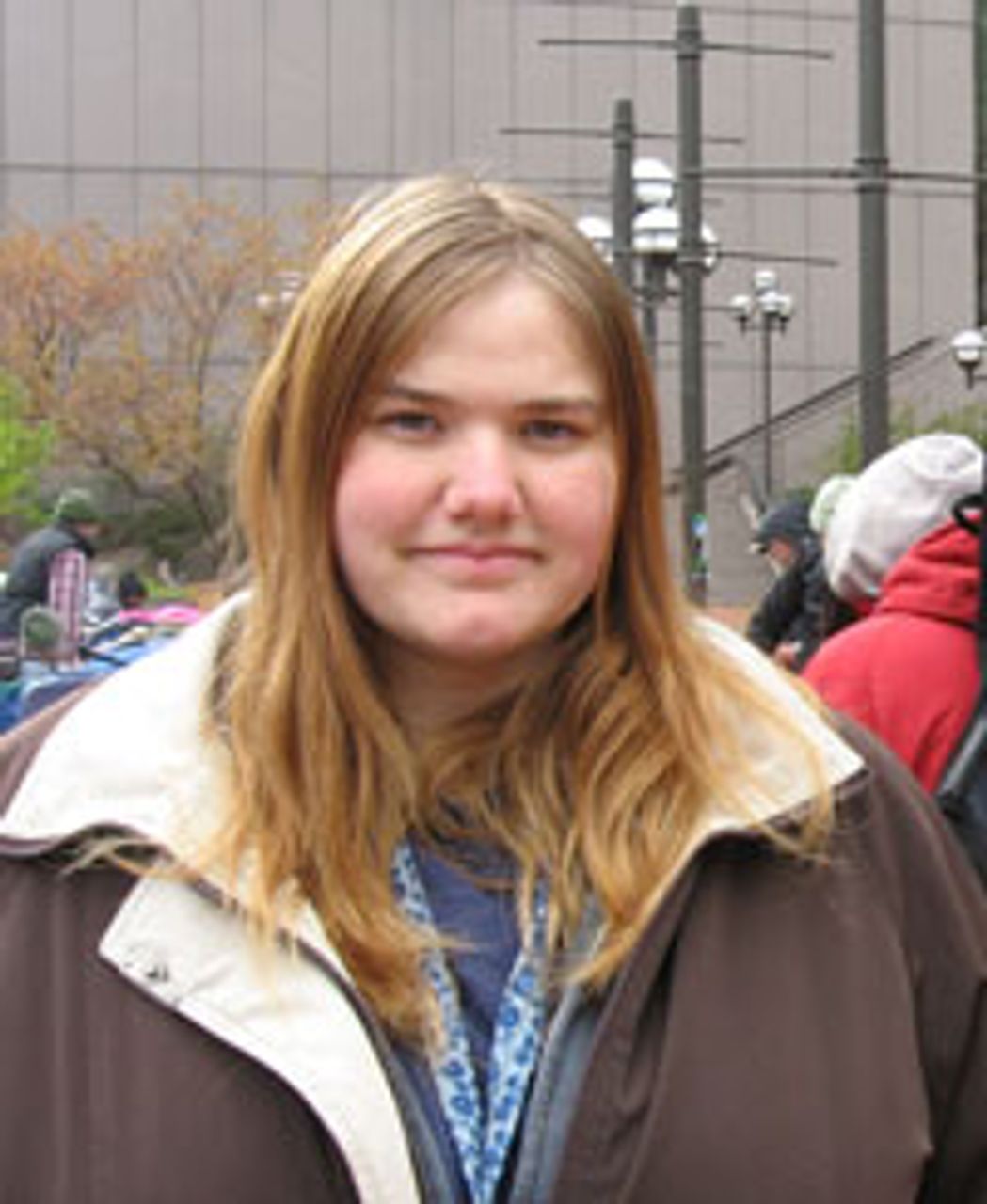The Occupy Wall Street movement in Minnesota, which has set up an encampment in downtown Minneapolis, has targeted banks in the past week to protest student debt and home foreclosures. Students are angry over the rising cost of education and the ever-increasing corporate control of academic institutions. The occupation has targeted demonstrations at the downtown offices of Wells Fargo and TCF.
 Rally in Minneapolis
Rally in MinneapolisOccupyMN.org cited a 2010 report on foreclosures in Minnesota by HousingLink.org that points out there were more than 25,000 foreclosures in the state last year. A local group, MN Neighborhood Organizing for Change, has charged that home foreclosures by banks have drastically affected funding for the Minneapolis Public Schools District. The organization calculates that Minneapolis schools have lost $28 million in state funding due to bank foreclosures that have driven families out of their homes and thereby students out of the Minneapolis public schools.
The WSWS spoke to Dan, who has been camping out at the Hennepin County Plaza, renamed the “People’s Plaza,” since the first day of the occupation. “Basically, I’m an economic refugee in my own country,” he said. “I was a good little corporate drone. And before I was a corporate drone, I was a government drone.
“When George Bush became president, I worked for Hennepin County. Governor Tim Pawlenty cut local government aid and that trickled down and affected Hennepin County severely. I didn’t have enough seniority and I got the boot.
“Then I got a job at an investment banking firm. It was through a temp agency. They told me it was data entry, but it was more than that. There I learned about the financial system and was horrified on a daily basis at what I saw.
“I had a ringside seat to the mortgage collapse. People with very little experience went in to financial institutions and were told by financial experts—predatory lenders—to sign up for ARMs, Adjustable Rate Mortgages loans. They told them not to worry about what the interest rate down the road will be, but, ‘Look at how cheap it is right now!’ This was predatory lending. And after five years when the ARM kicked in their interest rate went up and people’s payments skyrocketed.
“So in 2008, the first of the five-year ARMs began to collapse. Combine this with record trade deficits and skyrocketing national debt ... it was a prefect storm. It was October 2008 and everybody at work was talking about the market tanking. We were talking about institutions making huge trades, like five million shares of a stock. These institutions were dumping their shares in mortgaged backed securities. It was a financial slaughter.
“Then these SOB banks held the economy hostage. They said, ‘We need money or we will have to lay off all these people.’ So first President Bush, and then later President Obama bailed them out. The banks got a blank check with no oversight. They went ahead and laid people off anyway and then got record bonuses. I got laid off and the top three people at the bank where I worked saw their salaries go from $900,000 a year to $1.5 million. I’m not talking stock options or bonuses. That was just salaries.
“Goldman Sachs renovated their boardroom for millions. They put in new carpeting that cost thousands and thousands. But people who were losing their homes didn’t get bailed out. Who cares about the little people? The banks held the economy hostage, they got the money with a few suggestions, but they weren’t legally bound to follow those suggestions. It was carte blanche.”
 Kyleigh
KyleighKyleigh, who joined the occupation on its fourth day, told the WSWS, “I’m here because people that have nothing aren’t getting a say in what is being done today. I’m upset about people losing their jobs and losing their homes. And the people that have the money are making all the decisions. I think it’s unjust that 1 percent of the population has 40 percent of the wealth.
“My father was in the army, and fought in the Gulf War back in the 1990s. When he came back, he was suffering from post-traumatic stress syndrome. He had all these mental issues that he didn’t have before he went to war. What he saw in the war messed up his mind. He became very unstable. He couldn’t function. But nobody wanted to help him.
“If you are jobless or homeless, you are looked upon as nothing. But these people should be valued just as much as people who have money. These things have to change. This is why we want to keep the occupation running.”
Another occupier, who goes by the nickname “Double-D,” is now participating in his sixth day at OccupyMN. He told the WSWS, “Over the past 10 years of my life I’ve noticed how much influence our government and the legal system has affected our society, in both good and bad ways. For the first five years, this was just a gut feeling that bothered me. But recently, it just seems like there’s a lot of injustice, with the government overreaching their authority in people’s lives.
“What I think it stems from is the government’s attempt at social engineering American citizens so they can remain in power. And when I say ‘they,’ I mean the 10 percent of the world’s population that owns 90 percent of the wealth, 90 percent of the resources, and so on.
“Basically I can provide for my children. I have a good job. But that doesn’t mean their lives are going to be better than mine or my father’s. But money doesn’t give you freedom. It just makes you distracted enough to forget about what true freedom is. And when I talk about freedom, I’m talking about freedom of individual thought, freedom from political influence, freedom to choose with whom I associate and how I associate.
“My main reason for being down here is to make people aware of how to make a constitutional amendment to take away ‘personhood’ from corporations. If a corporation is considered to have the same rights as an individual, they can amplify their voice well beyond that of an individual. This comes down to campaign finance reform, because anyone with enough money can amplify their voice above 99 percent of the population.
“If you look at the US government and the other top 10 countries with power in the world, they represent a monopoly. If you give ‘personhood’ to an entity that’s part of a monopoly, it creates an uneven playing field that allows those with the monopoly to amplify their voice above the 99 percent.
“I’m focused on how the decisions of the Supreme Court have socially engineered this country. You have nine people making decisions for us. It’s a very powerful entity and that makes me nervous.”
